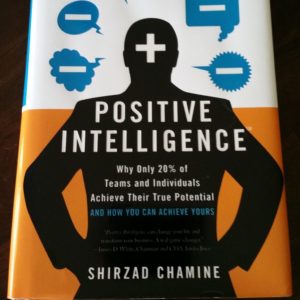
Not long ago I came across the book Positive Intelligence in a second-hand store and snatched it up to see what I could learn from it. One of my first loves in education was the study of psychology and in today’s world, I find it even more fascinating! It turned out to be a great book on how our thought patterns hold us back in life (duh!). But it also does a great job of explaining what we can do about it!
Unfortunately, I think mental health is totally underappreciated in our culture. We focus more on the doing and achieving than we do on the thoughts and emotions we’re dealing with. Then we sabotage ourselves by first judging ourselves, others, and finally our circumstances negatively. In the end, this just keeps us from achieving real happiness in life.
Like most people, I struggle with my thoughts and emotions and spend entirely too much time trying to figure out what to do about them! I waste time ruminating (repetitive negative thoughts) over things from my past that I can no longer change. Or I worry about things that could happen in the future but probably won’t. So I can admit I need more tools to deal with these issues.
In my new career as a fitness and health coach, I believe that our mental health needs just as much attention as our exercise and nutrition habits do. If we don’t understand what’s going on in our heads then we’ll always struggle with peace, happiness and our relationships.
I’m not really a book reviewer, but when I find one that’s this good I have to share! So let me try to explain what you might learn from this book that I found so enlightening.
What is Positive Intelligence?
Positive Intelligence was written by Shirzad Chamine, Chairman of CTI, “the largest coach-training organization in the world”. With a long list of degrees, he learned that he first had to recognize and deal with his own negative thought patterns in order to coach others to success.
After a difficult childhood, a simple college team assignment taught Shirzad how his unhealthy coping mechanisms (thoughts) were affecting his relationships with others and holding him back. He writes that:
“Your mind is your best friend, but it is also your worst enemy”
Positive Intelligence refers to “the relative strength of these two modes of your mind”. In other words, how often it’s acting as either your best friend or your worst enemy at any given moment. With a little practice, we all have the ability to recognize which part of our brain is in control. Once we recognize that we’re able to do something about it.
When our mind works for us in a positive and constructive way he calls that “positive intelligence”. On the other hand, “low positive intelligence” means that our mind acts as our enemy more often than it does our friend. This makes success, and real happiness, much harder to achieve. So it’s in our best interest to learn to recognize our thought patterns and correct them.
What is PQ?
PQ is the positive intelligence “quotient”. This is your score, on a scale from 0-100, that tells you the percentage of time your mind is acting as your friend as opposed to your enemy. The higher your PQ score is the more it benefits you. The lower your score is the more you struggle in life.
Studies show that a “higher PQ leads to a higher salary and greater success in the areas of work, marriage, health, sociability, friendship, and creativity”. And who doesn’t want all that?
How do we improve our PQ?
Through research, Shirzad has determined that a PQ score of 75 is the “tipping point” and 80% of all people fall below it. With a score above it, you generally have enough control over your thoughts to create success and happiness in life. A score below 75 means you’re still struggling with being dragged down by your negative thoughts.
So how do we improve our PQ in order to become more successful? The key is to first identify your negative internal thoughts, or what he calls our “Saboteurs”. These are thought patterns that work to sabotage each of us. Then you need to tap into the wise and positive part of your brain called the “Sage” that works to help you.
The Saboteurs are coping mechanisms left over from childhood that helped to protect us when we had less control in our lives. Unfortunately, they’re no longer very useful to us. There’s one main Saboteur, “the Judge”, that we all suffer from. But there are nine other accomplices that we may struggle with to some degree. And they ALL work against us!
The Sage gives us access to our greatest powers: empathy, exploration, navigation, innovation and decisive action. It rises above all the drama and helps us realize that we can do anything if we have the right mindset. The trick is to learn to be aware of what we’re thinking and start recognizing when our Saboteurs are trying to negatively affect our lives.
It’s important to realize that both the Judge (the greatest Saboteur) and the Sage perspectives are self-fulfilling prophecies. We choose how we see the world and the people in it along with how we react to it.
The author’s lesson in this book is that our thoughts and our reactions to things that happen to us are choices. But just because something is a choice doesn’t mean it’s an easy fix to change it!
How this book can help you
Shirzad lists the nine saboteurs that work against us and gives descriptions of each one. You can carefully read through them to help you identify which ones are affecting you the most. Once you understand the negative thought patterns affecting your life you’ll start to notice them as they pop up.
He also talks about the five powers of the Sage and how practicing them can help you to overcome your Saboteurs and move forward in life. And just like with everything else, it’s all about practice!
For me, reading a book gives me many more details and a better understanding than what I can usually find online. And it’s written in a way that makes everything very easy to understand. He also gives some great examples of people who struggled but overcame their own Saboteurs and explains how they did it. So of course it’s educational but it’s also inspiring.
For those of you who don’t like to read books
If you don’t like to spend your time reading books then you can go to his website to take a quick test of which Saboteurs you struggle with the most. Once you’ve done that you’ll be sent additional information on how to interpret your results. Just visit positiveintelligence.com/saboteurs/ to start the test.
But even if you do read the book the online test might help you get more clear on the Saboteurs you’ve adopted over the years. So I would recommend both.
My final thoughts
This book is perfect for anyone who struggles to understand what’s going on in their heads. And according to research, that’s most of us! If you’re trying to reach a state of peace, mental happiness, and more success in life then this is a great tool.
Dr. Chamine gives practical advice on how to recognize and overcome our saboteurs. As we all know, it’s one thing to talk about our problems and a totally different thing to know how to fix them! You’ll find out it’s not that hard after all if you take the time to practice what he suggests.
This book came at a perfect time for me. While I’ve been transitioning to a different career I’ve been struggling with the typical worries and doubts that come with diving into something totally new. It’s helped me to understand how my thinking has been holding me back more than my circumstances in life are.
With Shirzad’s advice, I’ve started practicing becoming more aware, and therefore, more in control of my wandering mind! Check this book out if you would also like to become a higher achiever and live a healthier, happier life!
If you’re struggling with reaching your health goals, check out my online health coaching program for help with exercise, nutrition, sleep and stress management. Sometimes you need someone to walk that road with you in order to move forward.
Related article: You need a mental health day!

